Nerine Dorman's Blog, page 90
November 20, 2012
The Next Big Thing
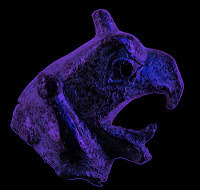 Okay. I eventually caved. So I'll continue the meme but those whom I've tagged have probably already done this. Thanks to Louis Greenberg for making me get onto this.
Okay. I eventually caved. So I'll continue the meme but those whom I've tagged have probably already done this. Thanks to Louis Greenberg for making me get onto this.What will be the next big thing in the world of fiction? Every so often a book, or a series of books, will come along and knock our collective socks off, be it Harry Potter or the Da Vinci Code or even Fifty Shades of Grey.
The Next Big Thing sets out to give writers an opportunity to nominate peers they think are worthy of your attention.
The rules are simple. A writer nominates you to answer ten questions about your current work in progress. You answer those questions and then in turn, nominate a further five writers to do the same thing.
Author of First Kiss, Last Breath , Lee Mather kindly nominated me. I first encountered Lee when I reviewed his story, The Green Man , and knew that this was an author I was dying to edit (okay, not literally but yeah I dig his writing). So, to cut a long story short, I encouraged him to submit his next manuscript to me when I was still editing for Lyrical Press and, as they say, the rest is history.
So, on to my interview:
1. What is the working title of your book?
I’ve got two manuscripts I’m currently working on. One is Thanatos, the follow-up to my novel Inkarna . I’m kinda stalling on it because this month I’m concentrating on sorting out this year's Bloody Parchment entries so they can go through to judging. In addition, I’m also working on a fantasy novel I’m writing just for myself, about a talking griffin. It’s tentatively called The Blackfeather Chronicles, but I’m sure I’ll have a proper name soon.
2. Where did the idea come from for the book?
Thanatos follows the rest of the story of how Ash gets into further trouble. It’s a continuation of events that were set in motion in Inkarna. For the sake of not writing a doorstopper, I had to split the story at a natural pause. Similar idea for Blackfeather. I’ve tentatively planned a trilogy, and I’m essentially over the halfway mark for both manuscripts.
3. What genre does your book fall under?
Urban fantasy for Thanatos, and secondary world fantasy for Blackfeather.
4. Which actors would you choose to play your characters in a movie rendition?
If Daniel Radcliffe were willing to work out a little, he’d make a great Ash. I recently saw him in The Woman in Black, and he’s grown up quite nicely. I don’t think he’s quite tall enough but he has the right facial structure. And my ever-talkative griffin has none other than Johnny Depp as the voice.
5. What is the one-sentence synopsis of your book?
Thanatos: Eternal enemies are not about to allow Ash his chance for a life of quiet contemplation.
Blackfeather: A young griffin finds himself cast into the role of an unlikely hero, but can he learn to fly in time to save his mistress?
6. Will your book be self-published or represented by an agency?
Thanatos is promised to Dark Continents Publishing, who brought out Inkarna. Blackfeather I’m self-publishing since I don’t think it’s going to have mainstream appeal. There are no love triangles…
7. How long did it take you to write the first draft of your manuscript?
Too long, LOL. I’ve decided to write when I can without pressure of deadlines, so I manage anywhere between 2k to 4k a week combined. At a push I can do about 45k a month but I don’t feel like doing that right now. I just want to enjoy writing.
8. What other books would you compare this story to within your genre?
My Inkarna-verse I’d lump with Alma Katsu’s The Taker or Anne Rice’s Interview with the Vampire. Or even Poppy Z Brite’s Lost Souls or Neil Gaiman’s Sandman graphic novels. There are underlying themes that offer similarities in genre.
Blackfeather will appeal to fans of Anne McCaffrey's Dragonriders of Pern novels or Mercedes Lackey's griffins.
9. Who or what inspired you to write this book?
Real life is dull. I make up stories to pass the time. Also, I can't afford to pay a psychiatrist.
10. What else about your book might pique the reader's interest?
Here is a short excerpt from Blackfeather to sucker you in:
Like most of the strays my mistress brought home, I was one of the many she rescued from the market. And I’ll remember that day for the rest of my life, better than I do the events surrounding my initial capture. For certainly, as one belonging to the proud race of griffins—and Ravenkin no less—I should have some remembrance of a nest, of siblings and a mother. But, alas, those memories remain locked away.
The basket was small enough that I couldn’t turn, and the scraps of linen lining it soiled by my own waste. Terrible hunger blinded me to all reason—not that a griffin cub was wont to expressing any rational thought—but when I looked into Her eyes, the ravenous fires died back and, I’m later told, I stopped the incessant squawking and yammering with which I’d apparently been painting the very air blue.
Petite Anwyn had eyes like lapis lazuli, and her skin was bronzed—not from the sun but partially, as I later discovered, due to her foreign mother. And her hair. I always loved her hair—the palest gold, like corn silk. Eventually I would understand that her complexion was far too unusual to be considered attractive, but at that moment I gazed upon her face and I was lost. Some dim griffinish race memory stirred a resonance within me and I craned my neck so that I might be closer to her.
Her gaze was filled with compassion and I knew at that moment, even as I do now, that I belonged to her. Forever.
She didn’t have to haggle long to liberate me from the beast-seller. In hindsight I reckon the man felt, at that point, that he was well rid of me—a noisy, messy nuisance. Had he known my sheer magnificence once I’d fledged, he might have driven a harder bargain.
An unfledged griffin cub, I can guarantee, is nothing much to look at. Anwyn made many sketches of me when I first came into her care. A wide gape, almost bulbous eyes. Kittenish hindquarters unbalanced with the forequarters of a bird. Stumpy wings. Instead of glossy black feathers, I boasted a mess of vaguely charcoal-hued fluff. At this early age no one could really tell whether these would turn out to be pelt or plumage.
Griffins were almost unknown back then—and still remain rare—but when I was a mere cub no one knew enough about my race to know what to do with me. If Anwyn hadn’t come along I might’ve been pecked to death by the brace of basilisk hatchlings in the cage next to me or ended up in one of the labourers’ cookpots.
Instead I was given a name, a very fine name I might add—Silas Blackfeather—and took up residence in a small villa on the outskirts of the great city of Anfi, in the foothills of the Makarra mountains.
--------------------------------------------------------------------
While I don’t expect these good folks to do The Next Big Thing (and some of them undoubtedly already have, I’m going to name some of the authors I’m close to and whose writing is absolutely marvellous.
Cat Hellisen is a close writing buddy of mine and she’s often delivered concrit just when I’ve needed it. I’ve beta-read her novel, When the Sea is Rising Red , and absolutely adore her "Hobverse". If I could write half as well as her I’d consider myself a great author.
Next up is Carrie Clevenger, with whom I’ve collaborated a few times. I edited her debut novel, Crooked Fang , and we’re writing buddies. I totally appreciate her eye-rolling when it comes to curbing my tendency toward purple prose. She also has a great love of music and has introduced me to so many new bands.
Then I need to mention Cari Silverwood. We’ve walked a long way together and I’ve edited one of her novels, Rough Surrender . She writes some of the most scorching scenes in BDSM erotica and I’m watching her career with great interest. She strikes the balance between writing heat and narrative.
Amy Lee Burgess is an old friend of mine and I remember ages ago begging her to write me something to edit. So she wrote about wolves, and her The Wolf Within series came into being. Seriously, if you’re looking for a wolf shifter story with a difference, go read her books.
I must make mention of Toby Bennett because he doesn’t make enough mention of himself. I first encountered him last year when one of his short stories made it into the Bloody Parchment anthology. But he writes books too, and he tells absolutely amazing stories. I’m looking forward to reading his novels.
--------------------------------------------------------------------
My Goodreads author page...
Stalk me on Twitter @nerinedorman
Published on November 20, 2012 00:36
November 19, 2012
Welcome to Chandra Ryan, author of Bond Betrayed #guest
 Chandra RyanToday I welcome Chandra Ryan over to chat about her novel, Bond Betrayed. For those who don't know the history, can you tell us a little more about the Community and how it functions?
Chandra RyanToday I welcome Chandra Ryan over to chat about her novel, Bond Betrayed. For those who don't know the history, can you tell us a little more about the Community and how it functions? The Community is another race of beings that coexist with humans but, because they have magic, they try to keep their existence a secret. They are born with one of several abilities. Some key ones are fire manipulation, shape-shifting—they can change their appearance at will, some are empaths, and at least one is a seductress. Even though some humans know about their existence, they try to keep it to a minimum and so have their own police agents called enforcers. Nothing would blow their cover quicker than having a fire manipulator taken into human custody.
What was your favourite scene to write from Bond Betrayed?
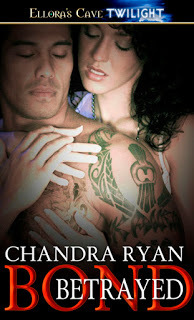 My favorite scene to write was the opening scene. Nikki and Isaac are meeting for, what she thinks, is the first time and he invites her back to his place for a quickie. Instead of entanglement-free sex, though, he bonds her to him because Nikki’s father has Isaac’s sister captive and Isaac wants to use Nikki as leverage. Both characters are so strong and have such full backstories that their personalities really jumped out while writing it.
My favorite scene to write was the opening scene. Nikki and Isaac are meeting for, what she thinks, is the first time and he invites her back to his place for a quickie. Instead of entanglement-free sex, though, he bonds her to him because Nikki’s father has Isaac’s sister captive and Isaac wants to use Nikki as leverage. Both characters are so strong and have such full backstories that their personalities really jumped out while writing it. And your most difficult?
It would have to be the confrontation scene near the end. I knew it was coming and I knew what had to happen, but I hated dragging Nikki through it. But it was important for her to face her demons. It had to be written.
And this is the fun question I love asking authors. If you were given the opportunity to do the casting for the film of Bond Betrayed, who would you choose for your lead roles?
Hmmm…. I think Christian Bale would make an awesome Isaac. When his hair is longer and he’s a little scruffy he is very bad-boy yummy. For Nikki I think I’d cast Kate Beckinsale. She just has this naturally seductive quality and yet is still kind of dark and edgy.
What have some of your reviewers said about your writing?
Ink in the Blood:
“Ink In the Blood by Chandra Ryan was a dark, sexy surprise wrapped in a small package.”- Bitten by Books
Ravenborne:
“Ravenborne has everything I look for in a book: strong, likeable, honorable characters; compelling story line; and heart pounding romance based on mutual respect and love instead of mere physical attraction.”- Long and Short Reviews
Dragonborne:
“This tale is very imaginative. I enjoyed the land and people that author Ryan created. Sophie has a very strong sense of self which I applaud. Reuel is a dragon unknowingly looking for a home and people that accept him and this inner conflict that he has makes him endearing. Combined they make quite a formidable pair with lots of heat.” - I Read Romance
In short:
Favourite food for stormy weather... Pasta. Preferably with a cream sauce.
The movie that's your guilty pleasure... French Kiss.
Where do you keep returning to for your holiday... My hometown.
Which band's currently featuring on your sound system? Metric
Where do you see yourself in 10 years' time? Here. I love where I’m at.
Check out Chandra's website at www.chandraryan.com
Buy Bond Betrayed here
Published on November 19, 2012 03:49
November 16, 2012
Andrew Burt on ReAnimus Press #guest
 A few words by way of introduction. Andrew Burt is the man behind the Critique.org Workshop, an online writers' group that did much to help me fine-tune my writing and gain enough confidence to get my writing to the point where it was publishable. While I'm no longer an active member, this is one site that I send all aspiring F/SF/H authors if they're looking for a way to hone their craft. I've made many friends here, some of whom I've gone on to edit.
A few words by way of introduction. Andrew Burt is the man behind the Critique.org Workshop, an online writers' group that did much to help me fine-tune my writing and gain enough confidence to get my writing to the point where it was publishable. While I'm no longer an active member, this is one site that I send all aspiring F/SF/H authors if they're looking for a way to hone their craft. I've made many friends here, some of whom I've gone on to edit. Andrew Burt now has another project that's just as valuable as Critique.org, and that is ReAnimus Press. So, without further ado, I hand over my blog to Mr Burt so he can tell us more.
* * * *
ReAnimus Press is my new baby, which I founded to help authors get ebooks published.
I've been saying how cool ebooks are for years, since back when I was VP of SFWA. I'd been reading on my phone for some time and loved how portable it was. Of course back then ebooks were like 0.01% of sales, mostly a few early small- and self-published books. Few folks could see them going anywhere. Things were so primitive I used to email authors I knew whose books I wanted to read and ask if I might have a copy of their manuscript so I could read it on my phone. I remember talking with Jeff Bezos of Amazon at dinner at the Nebula awards and encouraging him to look into ebooks. I doubt I had much impact on things, but lo and behold, ebooks have now become the top-selling format for books. That's caught a lot of authors and publishers unprepared.
Most authors don't exactly make truckloads of money, so the next logical step is for authors to decide how ebooks fit in to maximizing their income. The major publishers don't offer the greatest terms (not to mention that many books went out of print for a reason, i.e., slow sales). So there are millions of backlist and out of print books out there. Doing ebooks of those represents a huge opportunity for authors collectively.
The problem is that it's still not simple for authors to create ebooks of their work; especially if the only copy is in print. Even if they have a manuscript file of a book, they get edited, so authors usually don't have a digital copy of the final text.
Now, several years ago I decided I wanted to lighten up my shelf space. I had thousands upon thousands of books in the house, and a lot of them were down in the basement where it was inconvenient to look at them. So I started scanning them. I got pretty good at it.
My background is in computer science -- I was a computer science professor for a long time, as well as CEO of a tech company (and probably best known as the founder of the first Internet Service Provider, back in the day when folks couldn't get on the Internet and I thought that was a shame). So I started fooling around with improving the quality of the OCR scanning results. I scanned a huge number of my old books, just for my own edification.
You can see where this is leading. Now that ebooks are mainstream, and authors can benefit from having their work out there, I decided to start ReAnimus Press to help "reanimate" old books. As an author myself, I wanted to be author friendly, so we pay the highest royalty rate of any publisher I'm aware of, and we also offer individual ebook services at low cost for those who want to do their own ebooks, and just want help with certain hard parts of the process (scanning, or OCRing, proofreading, covers, etc.).
Since last year we now have over 60 books either already published or in the works. We work with folks like Ursula K. Le Guin, Ben Bova, Robert Silverberg, and so on, though we also work with lesser known and even as-yet-unpublished authors. While we're not a "science fiction publisher," since I know a lot of science fiction writers, we have a lot of SF/fantasy/horror in the mix; but we also have books on writing,
children's books, mysteries, romance, biographies, and so on. Any genre.
We've recently also branched out and release our first few new, never-before-published books. We have an amazing book on how to write science fiction story openings written by a member of my Critters Writers
Workshop, who analyzed 1400(!) stories, pro and non-pro, for how they constructed their openings; that revealed some really interesting patterns. We've also branched out in format, doing print books now also.
And just this month we're releasing the three books of THE SIGIL TRILOGY by Nature editor Henry Gee. I read a draft of Henry's book some years ago, and really loved it. The thing is, it's huge; it's one book at about 900 print pages. It's an incredible story, about science, humanity, love, pretty much everything that matters. I'm really pleased we get to publish it.
See http://reanimus.com/store/
Published on November 16, 2012 01:03
November 14, 2012
The Lucifer Principle by Howard Bloom #review
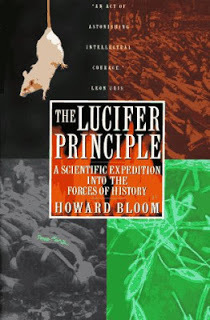 Title:
The Lucifer Principle
Title:
The Lucifer Principle
Author: Howard Bloom
Publisher: Atlantic Monthly Press, 1997
Every once in a while there’s a book that keeps cropping up in conversations that I have with friends, and The Lucifer Principle by Howard Bloom is one of them. And I’m glad I picked it up. If Lyall Watson’s Supernature made an impact on you, then there’s a good chance you’re going to gobble up Bloom. In essence, the author offers a broad-sweeping yet thought-provoking Theory of Everything, with a vast collection of ideas and factoids that have been doing the rounds for ages.
Except, let’s take not at *what* Bloom’s saying but *how* he’s saying it and *why* he’s saying it in this glorious mash-up of history, psychology and biology. At the heart of it, Bloom looks at mankind’s innate propensity toward violence. He identifies in our behaviour similarities between other mammals. He discusses how a relatively “new” concept – the meme – goes about arranging individuals into groupings labelled as superorganisms. But if you look at the bigger picture, we ourselves, as beings are superorganisms consisting of many billions of cells.
Just as individuals will compete for resources and mates, so do superorganisms, such nations or religions. Bloom investigates what allows these to wax and wane, and discusses the motivations for conflict. Nothing he puts forward here is groundbreaking, but what makes this book important is *why* he’s stating the obvious.
Bloom spends considerable time discussing US vs. Islamic conflict and, considering *when* the book was first published (1995) this is quite ironic considering the occurrences a mere five years after publication. He highlights the dangers of a complacent West sticking its head in the sand, and stresses the danger of nations under the sway of militant religious fundamentalists.
According to Bloom, “evil” is inherent in our natures, very much encoded in our genetic make-up and, while I appreciate the exhaustive illustrations of the problem, I do feel he could have offered more by the way of solutions. That being said, this book is definitely one that needs to be read if we are to make others understand the importance of rational solutions to age-old problems. Yes, the author writes with a highly opinionated tone, and he’s full of rage, but he’s one of the few so far as I can see who isn’t afraid to call us out on what’s wrong with society today – and has been wrong since we first climbed down from the trees.
You *don’t* need to agree with this man, but I do believe his voice needs to be heard, especially in the light of so many people screaming ignorance in the media today.
Published on November 14, 2012 01:35
November 12, 2012
On leopards, a chat with Fransje van Riel

Recently I had a chance to read My Life With Leopards: Graham Cooke's Story by Fransje van Riel. Since I was a wee sprog I've always loved real-life accounts of people's interaction with animals, and folks like James Herriot, Gerald Durrell and Joy Adamson often had me spellbound, even if many of the stories didn't always have happy endings. Today I welcome Fransje to my blog, because after reading My Life With Leopards, I absolutely had to chat with her about the writing process. Welcome, Fransje!
For any nature lover, getting the opportunity to write a book like My Life With Leopards is a dream come true. How did this project come into being?
I received an email one morning from Graham, who I didn’t know then, and it took me some time to understand that he was writing to me because he thought I was working with baboons. He had just read my first book, Life with Darwin and Other Baboons (also a Penguin title), and mistakenly believed that I was Karin Saks, who I had written the book about.
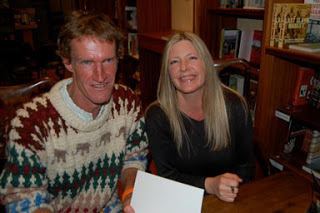 Graham Cooke and Fransje van RielWhilst I was figuring this out Graham sent me a second email which included his CV, which had a photo of him and Poepface on it. Naturally I was immediately intrigued and asking after it, I slowly learned that he had raised two leopards cubs in the middle of the South African bush. Since I am a huge cat lover, both domestic and otherwise, my senses were piqued and so I came to know more about Graham’s feelings for Boycat and Poepface and the sense of loss he still felt after all these years. When I suggested that he write a book about his experiences, Graham said that he had wanted to do so for many years but that it had never come about. He had though written a 10 000-word manuscript which he sent to me for appraisal. I knew it wouldn’t work the way he had gone about it and suggested that I write it. And so we began talking, emailing and meeting. I interviewed and taped him for a whole week and then I had the nuts and bolts of the story, so I could begin to start giving shape to the story. This was followed up by countless daily emails until I had the entire scene in my mind and was able to ‘become’ Graham and virtually experience his life with leopards in a very surreal way.
Graham Cooke and Fransje van RielWhilst I was figuring this out Graham sent me a second email which included his CV, which had a photo of him and Poepface on it. Naturally I was immediately intrigued and asking after it, I slowly learned that he had raised two leopards cubs in the middle of the South African bush. Since I am a huge cat lover, both domestic and otherwise, my senses were piqued and so I came to know more about Graham’s feelings for Boycat and Poepface and the sense of loss he still felt after all these years. When I suggested that he write a book about his experiences, Graham said that he had wanted to do so for many years but that it had never come about. He had though written a 10 000-word manuscript which he sent to me for appraisal. I knew it wouldn’t work the way he had gone about it and suggested that I write it. And so we began talking, emailing and meeting. I interviewed and taped him for a whole week and then I had the nuts and bolts of the story, so I could begin to start giving shape to the story. This was followed up by countless daily emails until I had the entire scene in my mind and was able to ‘become’ Graham and virtually experience his life with leopards in a very surreal way.Getting into the mind of someone who's had all these experiences must be quite something. Something that struck me while I was reading was that you managed to very vividly evoke the bush. Were you able to eventually visit Londolozi? How do you slip into a person's skin in this way?
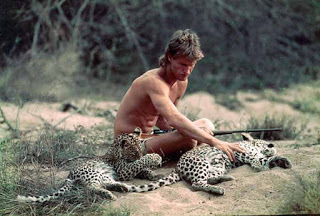 Graham with the two leopard cubs he cared for.I liken it to playing an acting role. You just find out as much as what you can about the character and become the part. Only then do you ‘see’ in your mind what and how things would have transpired (according to the information provided by Graham) and translate that into words. I admit that the experiences felt so real that it is as if I was there and knew the cubs and the other characters as well even though I have never been to Londolozi … I was told by someone that the old Tree House still exists, although I am not sure in what state, but I would love to visit Londolozi and visit the exact place where Graham’s old camp stood. I can only imagine it to be a deep and very moving thing to be so close to something that is so intangible …
Graham with the two leopard cubs he cared for.I liken it to playing an acting role. You just find out as much as what you can about the character and become the part. Only then do you ‘see’ in your mind what and how things would have transpired (according to the information provided by Graham) and translate that into words. I admit that the experiences felt so real that it is as if I was there and knew the cubs and the other characters as well even though I have never been to Londolozi … I was told by someone that the old Tree House still exists, although I am not sure in what state, but I would love to visit Londolozi and visit the exact place where Graham’s old camp stood. I can only imagine it to be a deep and very moving thing to be so close to something that is so intangible …Well, you certainly did an excellent job bringing across the cubs' personalities, and the very strong bond Graham had with them. And yourself, have you ever had any close encounters with big cats?
Thank you, Nerine. I have had a few interesting encounters, yes. I was fortunate enough to meet up close and personal several cheetahs that had been rescued from abusive situations and that were cared for by my friend Lise Hanssen, who now researches the demography of spotted hyenas and other large carnivores in the Caprivi. Was also privileges to be present when she darted a large female hyena that she wanted to radio collar to study her movements on Google Earth. Fascinating to be so close! Also just last year I was on holiday in the Kgalagadi Transfrontier Park on the South African side only to have a large male lion come up the dune slope and walk right past my unit at less than 4 meters distance without any fence. I was astounded afterwards to realise that I hadn’t been scared as the lion had no ill intent at all and just traipsed past as a short cut to access his pride over the opposite dune. It goes to show that as people we are so out of tune with nature that we find it difficult to perceive large cats as anything but dangerous. In a sense that is what I do hope the book will bring about; a sense of respect and understanding for animals such as leopards. Yes, they are proficient at killing prey for food and yes, in our horribly overpopulated world we compete with them for space, but given the opportunity they are as capable as forging a close bond and develop trust with humans as some other, more domestic type of animals.
Each book an author writes is a journey. Would you say that writing My Life With Leopards with Graham has changed you in any way?
Not changed so much, but certainly enriched. I feel a depth; very strong emotional feelings for those two leopards and I often think about them. I ‘see’ Boycat and Poepface walking along the riverbed and even more so in Zambia. It is as if their energy has somehow infiltrated in some areas of my life and sometimes this can still move me to tears.
Yours is certainly a special gift – being able to step into someone else's shoes to allow readers to see the world through different eyes. Can you share briefly how you came to be doing this sort of writing? Are there any special qualities you feel an author needs?
I think it is a combination of reporting on someone/something (I also like to write travel features and my own travel experiences) and share that which I see with others, combined with a very strong sense of awe and wonder I have for the natural world, and wanting to impart that on other people who are open to it. As a child I was always writing notes and little poems although I completely forgot about my early love for writing and headed in an entirely different direction; working for an airline. That indirectly though brought me to Africa and that inspired me to write again. When I moved to SA in 1997 I wrote a travel story and to my own surprise managed to sell it. That was the beginning of many stories (see www.fransjevanriel.com).
During one of my trips to Kenya (on a stay-over as cabin crew) I recall saying out of the blue that one day I was going to write a book. I had no idea where it came from, but many years later I did, with two more to come. I think as with everything in order to do something well you need to have a genuine love and interest for that which you do. Maybe a little skill and experience helps too J
The one thing I do know is that as an author you need a hell of a lot of commitment, dedication and sheer discipline. Add to that a sprinkle of doggedness and a good dose of stubbornness… Once the words flow it all seems so easy, but behind any line, paragraph, page and chapter lies an unseen world of hard work, frustration, joy and belief in that which you are trying to get across.
See the Facebook page My Life With Leopards and my website www.fransjevanriel.com
 BIO
BIOFransje van Riel was born in Holland but moved to the UK where she spent the majority of her teenage school years in the rural countryside of East Sussex.
After her return to The Netherlands, she started working as a flight attendant for KLM Royal Dutch Airlines. Frequent flights to Africa revealed a long lost passion for wildlife, which culminated into resigning from the airline in 1997 to make the move to the African continent.
Here she embarked on a career in writing and, after publishing numerous wildlife and travel related stories for South African magazines, Fransje started writing Life With Darwin and Other Baboons, a book on Karin Saks, who dedicated her life to the welfare of primates and which eventually led to the production of Baboon Woman, a full-length British television documentary.
The book was published by Penguin SA and was translated in Dutch and published by The House of Books.
Fransje’s second book of non-fiction The Crowing of the Roosters was published in 2006 by South African publishing house David Philip and, consequently, in Holland by Arena Books. The Crowing of the Roosters was nominated later that year for Africa’s premier literary award The Sunday Times / Alan Paton Award.
In between writing freelance articles on wildlife, animals, travel and conservation issues, Fransje is active in raising awareness for several animal welfare projects, including rousing media interest for a local one-woman organisation called SAMAST, which is dedicated to consistent spaying of dogs and cats in Cape Town’s disadvantaged areas.
Fransje lives in a leafy suburb in Cape Town where she enjoys writing in the companionship of her three cats.
Published on November 12, 2012 02:12
November 8, 2012
On Penguins... #musings
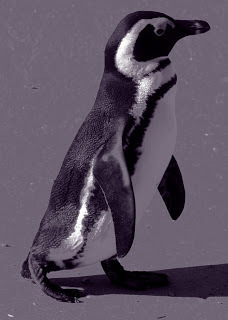 Picture: Wiki Commons
Picture: Wiki CommonsWhen I was a wee sprog, one of my life’s ambitions was to be a game ranger. While I may not have gone on to study nature conservation, being a writer occasionally allows me to indulge in some of my childhood dreams. (That’s when I’m not chained to my desk as a sub-editor, which is what pays the bills.) I’ve been all over the place—have had a Guinness in the Gravity Bar, eaten swordfish in Mauritius and I’ve tracked white lions in the Karoo. Sounds glamorous, but the cool stuff doesn’t happen nearly as often as I’d like it to.
The other day I was chatting to some bookish folks on Twitter, and the subject of penguins came up, and yes, I have a penguin story for you today (because I have a habit of having the occasional adventure, okay).
Let me introduce Spheniscus demersus, otherwise known as the African or jackass penguin. In Afrikaans we call them the brilpikkewyn, which sounds way cooler, if you ask me, and they really do sound somewhat like donkeys. My ouma loved penguins, so much so that she was an avid supporter of Sanccob (http://www.sanccob.co.za/), an organisation that rescues these wonderful birds.
Now back track to 2000 when the Treasure oil spill disaster struck the southern African coast. I mean, we get oil spills often, but this was one of the big ones. I had just graduated the year before, and was still looking for a permanent job, so my sister, a veterinary nurse, pounced on me and dragged me out to Sanccob’s headquarters on the West Coast. She was volunteering to help treat the oiled penguins, and they needed extra hands.
“Come clean penguins,” she said. Who could say no to a request like that? It was better than waiting tables. Luckily for me my boss at the restaurant where I worked gave me the week off. Penguin wrangling, here we go.
Suitably togged up in oh-so-sexy green oilskins (I felt like a fisherman), I rolled up my sleeves... and, oh, and thick rubber builders’ gloves were so de rigueur. Those damn birds’ beaks are razor sharp. And those oilskins are necessary ‘cos not only do you get smeared in oil, but penguins, excuse my French, don’t give a shit about where they shit. But don’t worry, after a day you don’t care about that. And everything smells of fish by the time you’re done. EVERYTHING.
When we started, volunteers had brought in about 3 000 or so oiled penguins in. I thought, “Gee wow, that’s a lot.” How the hell were we supposed to get through this amount? It seemed like an insurmountable challenge.
Our first task was to tube-feed charcoal and electrolyte solutions. This was to counteract the poisons from the birds ingesting oil while preening and also to rehydrate them (oiled penguins can’t go fishing, so therefore they can’t eat and slowly starve to death). Tubing is easier said than done. Our method involved a pair of volunteers. One to catch and hold a bird between his knees. The other to feed a plastic tube down the bird’s throat so that the liquids could be administered.
Well, you try holding a wriggling beastie the size of a muscular rugby ball complete with flippers. All while managing the sharp end. I very soon had beautiful sets of bruises all the way up both arms. Then I received bruises on top of bruises. And a few lacerations for my pleasure. A penguin bites with the same ferocity as slamming a door repeatedly on your affected body part. Only the beak concentrates the pressure. Pinch the soft flesh on the inside of your arm between index finger and thumb really hard. Hurts, doesn’t it? Now multiply that by ten and you’ve got an idea what it feels like to be bitten by a penguin. That’s when the little blighter hasn’t slapped you through the face with his flipper. And Dog forbid you bring your face anywhere near that beak like one unfortunate volunteer did. You can lose an eye.
I very soon learnt how to *not* get bitten—or at least minimize the damage by getting penguins to bite less sensitive areas. And there’s a whole technique associated with approaching a penguin, distracting it with one hand while grabbing it with another. If you’re lucky, you grab it behind the head and hold it much as one would a venomous reptile—the first time. Or you grab it by a flipper, wait for the damned bird to fasten itself to the offending hand, then grab it behind the head while it’s making a valiant attempt to crush the bones in your wrist.
On the second day that we were at Sanccob, we got a call from the folks at I&J. They’d just donated the use of one of their big warehouses in Salt River, please could we send a team of volunteers, as they had a few thousand penguins, and the South African army was now helping catch birds. A local company had donated portapools. Each portapool contained a hundred penguins. Never mind the 3 000-odd birds at headquarters, within three days we were treating more than 11 000 oiled penguins at the warehouse. And they just kept coming. I think by the time things were really in full swing there were more than 17 000 birds. I still get choked up when I think of how many birds would have died if we hadn’t given a shit about helping. Okay, so I love animals. A lot.
Thousands of penguins in a warehouse, in hundreds of portapools—try imagine thousands of donkeys braying at the same time, and people shouting orders. Chaos. Yes. But by now Sanccob was helped by a number of wildlife foundations. And volunteers were flying in from as far afield as the US and Europe. Yes, there was a bit of politics going on with trying to sort out who was in charge of this entire mess, but what amazed me was folks giving up time to just help. And businesses that donated food and supplies. Very rarely have I experienced such a sense of community spirit centred around one cause.
Feeding the penguins was another matter. For this, huge truckloads of frozen pilchards were donated (by I&J, I think, so kudos to them). Some of the penguins had experienced rescue before, and our first job was to separate birds who would feed directly from one’s hand from the ones that had to be force fed. Luckily, penguins aren’t too dumb, and many birds soon learn to take fish directly from your hands. They kinda sidle up to you, side-eyeing the fish until they grab it from your fingers and swallow it down. But getting them used to feeding from your hand results in quite a mess. I went home each night with fish entrails and scales in my ears, in my hair … even up my nose. Sometimes penguins would refuse to swallow a fish already halfway down—by vigorously shaking their heads and flinging bits of mushy fish…everywhere. To this day I still can’t really eat pilchards. A messy business indeed.
Washing a penguin is quite a job too. A big plastic washbowl is set on a surface and filled with warm water. One handler holds onto the penguin. The other wields the soap. The end result: sometimes the bird slips out of your grip but he doesn’t have anywhere to go but swim in tight circles *in* the washing bowl until you catch him again. “Slippery when wet” is an understatement in this case. But washing is perhaps the most rewarding part of the whole endeavour. A brown-black begrimed bird is revealed in his true black-and-white glory, and can happily preen himself.
Granted, he can’t go back to the sea yet—he has no oil on his feathers—but he is clean.
If another oil spill as horrific as the one in 2000 were to happen, I’d book time off work and be there at the drop of a hat. Working with penguins was one of the most rewarding experiences I’ve ever had, even if it meant sitting on a crate in a guano-filled portapool with 100 miserable birds.
But I truly hope I don’t ever *have* to do this again. While thousands of birds were given a second chance, many died too, and the damage to our environment was horrific. As for the long-term impact? I don’t know. But I’m sure an environmentalist can fill your ears with horror stories.
Penguins? Well, I’ll always have a soft spot for these ungrateful little sods. Now I like to visit them at Boulders Beach (http://en.wikipedia.org/wiki/Boulders_Beach) and like to think that future generations of Capetonians will still be able to go check out these plucky little chaps in their tuxedos. And if you visit Cape Town, I hope you do too. They’re happy dudes who provide hours of free entertainment.
Published on November 08, 2012 23:37
Camdeboo Nights cover reveal
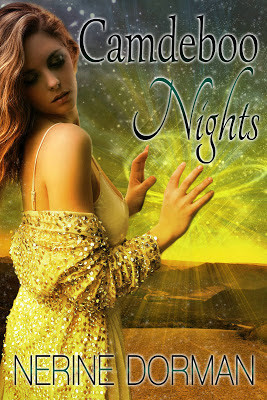 This novel's been sneaking up on me somewhat. I wrote Camdeboo Nights many, many years ago, shortly after I sold my very first novel, Khepera Rising, back in goodness knows when (I don't really keep track of these things anymore). I wrote another novel between the two, but it will remain forever buried at the bottom of a box I kinda lost somewhere (and for very good reason). Camdeboo Nights is so old I'm already rebooting the Khepera books, but it's one of my favourites, and was a quarter finalist in the ABNA Awards thingie way back when (2009, I think, I might be wrong). Subsequently it did the whole submissions mill but then stalled when a publisher had it on full sub for half a year. They eventually said no... and then I just didn't do anything with the novel until Lyrical Press started accepting YA subs and it was a case of "Oh, ja, there's this novel on my hard drive I've done nothing with". (really, I forgot I had it--ooh, look! Bright-shiny.)
This novel's been sneaking up on me somewhat. I wrote Camdeboo Nights many, many years ago, shortly after I sold my very first novel, Khepera Rising, back in goodness knows when (I don't really keep track of these things anymore). I wrote another novel between the two, but it will remain forever buried at the bottom of a box I kinda lost somewhere (and for very good reason). Camdeboo Nights is so old I'm already rebooting the Khepera books, but it's one of my favourites, and was a quarter finalist in the ABNA Awards thingie way back when (2009, I think, I might be wrong). Subsequently it did the whole submissions mill but then stalled when a publisher had it on full sub for half a year. They eventually said no... and then I just didn't do anything with the novel until Lyrical Press started accepting YA subs and it was a case of "Oh, ja, there's this novel on my hard drive I've done nothing with". (really, I forgot I had it--ooh, look! Bright-shiny.)So here's the cover for Camdeboo Nights, to be published by Lyrical Press. I'll give you a little hint: I wrote part of it in Nieu Bethesda while on holiday with good friends. Incidentally, HJ Lombard, the photographer who provided the background image of the Karoo landscape, was on holiday with me at the time. (Thank you, HJ, for allowing me the use of the image, you're the best.) Now go check out his studio here. He's an awesome photographer.
Then, a little bit about the actual cover design. When I found out that Valerie Tibbs was doing my cover, I knew I was in good hands. She's done a number of covers for some of the authors I've edited, so I consider it an absolute honour to have her do the cover for this novel. Now, go check out her website here.
So, when's the novel releasing, and what is it about? I'll say this much: it's a YA urban fantasy road trip that involves an entire menagerie of supernatural oddness, that takes place in South Africa. I blend a little African myth and magic with the standard tropes we've all come to know and love. We're still busy with the edits (at time of writing, the MS has gone to line edits.) The release date will only be finalised once I've signed off on the galley, and that's a while yet. Good things should never be rushed. ;-)
Published on November 08, 2012 11:59
November 6, 2012
The Casual Vacancy by JK Rowling #review
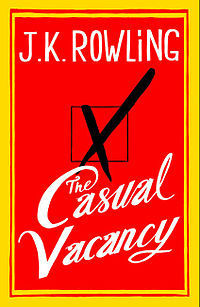 I purposefully avoided most of the reviews written about JK Rowling’s new novel,
The Casual Vacancy
, while I was reading the book myself. I wanted to experience the novel without any of the preconceptions of others. To a degree I was successful, and in retrospect I’m glad I made the effort.
I purposefully avoided most of the reviews written about JK Rowling’s new novel,
The Casual Vacancy
, while I was reading the book myself. I wanted to experience the novel without any of the preconceptions of others. To a degree I was successful, and in retrospect I’m glad I made the effort.The author warned readers right from the start that this wasn’t another Harry Potter. Unlike a large number of angry and disappointed readers I was vaguely aware of on my periphery, I took Rowling’s advice to heart. As much as that wiggly little childlike voice inside me whined and moaned for more Hogwarts, I fed it some codeine tablets and a chocolate bar and laid it down to rest while the adult in me settled in a cosy armchair over a cup of coffee to read The Casual Vacancy.
This is not a very nice book. Which is precisely why I absolutely adored it. That being said, I’m also quite happy to admit that if Rowling had not been the author, chances are very good I would not have picked it up. I am unashamedly a fan of JK Rowling’s, the same as I am a fan of Neil Gaiman, Storm Constantine, Anne Rice or Poppy Z Brite, and will give everything they write a fair chance even if they’re writing outside of their expected genres.
But more about why I don’t like nice books – they don’t come across as being authentic. Real life doesn’t have neat, convenient happy endings and, as much as it can be argued that reading is often a lot about pure escapism, I like knowing that there’s always a chance that the character I’m rooting for will fail. So, it’s down to personal preference.
If you’re looking for a rose-tinted happy ending, then DON’T read The Casual Vacancy. If you’re looking for a story where the underdog is likeable, DON’T read this book. In fact, there are absolutely no likeable characters at all in this story. Yes, there are some I grudgingly kinda like, but no one for whom I’d willingly don a cheerleading outfit. I’m pretty sure that if Barry Fairbrother didn’t die in the start of the book, some of his dirty secrets would have come tumbling out before long too.
He’s the real hero of this novel, and he bows out early, so we never get an accurate idea of what his true character is like. We end up viewing Barry through everyone else’s somewhat rose-tinted glasses, and he is placed on a pedestal, as the only resident of Pagford who was able to dream up a bigger vision which expanded beyond the narrow-minded pettiness of the others. What Rowling says, at the end, is that the world needs more people like Barry Fairbrother, and though I don’t want to spoil, I’ll suggest that in the end we do encounter someone who will step into the breach and fill his shoes. And it’s not anyone you’d suspect, so shhh.
I’ll say this much, that I was pleasantly surprised to see this character grow beyond the societal pressures.
As always, what I absolutely adore about Rowling’s writing is her characterisation. Her prose might not be scintillating, but, much like Neil Gaiman, George RR Martin and Stephen King, she understands the rare art of storytelling, and of offering readers characters with whom they can identify – who hold up a sometimes dark mirror to our own reflections.
We all know people like Howard, Samantha, Krystal, Kay, Gavin and Simon; people who are more often than not blind to their own faults. They lie to themselves as often as they lie to others, and act short-sightedly. They’re human, like us, broken and sometimes bitter. If anything The Casual Vacancy is a cautionary tale, warning us to be more aware of our interconnectedness, and the web that glues society together. Despite the tragedy of the human condition, the novel also dares us to hope, and if there is ever to be any change in the world, it must first start with oneself.
Published on November 06, 2012 23:41
November 5, 2012
Southern Bones by AJ Brown #feature
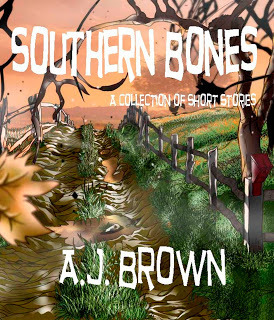 In the spirit of sharing about the works of my fellow authors, I've given a spot to AJ Brown today, author of Southern Bones.
In the spirit of sharing about the works of my fellow authors, I've given a spot to AJ Brown today, author of Southern Bones.Without further ado, here's the book's blurb:
Welcome to the South. Recognized for its traditions, beliefs and hospitality. The people are genuine and a helping hand and a home cooked meal are never too far away.
Welcome to the South. Where some traditions are better off forgotten. Where some beliefs are based, not on the Bible, but on what men want you to believe. Where behind the hospitable smiles are angry snarls trailed by the feral snaps of rabid people.
Welcome to the South. Where a house stands lonely on a hill, its owner a man deformed by life. Where children aren’t quite as naïve as they appear. Where the darkest secrets are found within its families, and where dying sometimes isn’t the end.
Welcome to Southern Bones, a collection of eleven short stories from the mind of AJ Brown.
And a little background on the Southern Bones collection, from AJ Brown:
Southern Bones is a collection of eleven short stories, all based in the south, though they really could be from Anywhere USA. They are considered horror, though I think that may be misleading. All of the stories have horrific elements to them, but unfortunately, there is no horrific elements genre.
The stories range from a terribly sad incident involving beautiful horses and the little girl who witnessed it, to a family's trip to a carnival that doesn't end so well for a couple of the members, to two orphaned little kids taken in by an angry drunk in a poor town, to the delusions of babies needing to be set free from the world and its sins.
Several of the stories have religious undertones to it, somewhat darkly delicious undertones.
The writing style is relaxed, almost conversational at points. There are two experimental pieces--one of which is probably the best story in the collection.
To be entirely honest, Southern Bones is not your typical action oriented collection of stories. It is mostly character and visually driven--more so than action, action, action.
Southern Bones buy link
About AJ Brown...
AJ Brown is a southern born country boy from a family of rednecks. He writes dark, atmospheric stories that doesn't so much scare you in the moment, but rather, creeps up on you and strangles you when you aren't looking.
Some of his stories can be found in Necrotic Tissue, Midnight Echo Magazine, Along the Splintered Path (collection) and Tales of the Zombie War, among others.
You can find him on Facebook and at his blog/website, Type AJ Negative.
And now, for an excerpt from The Burning Children:
Sitting on the steps of a rundown apartment building with busted windows on the first and second floors was another man, much younger than the bum on the street. He had his coat off and shirtsleeve rolled to his bicep. A belt was tied tight just above the crook in his elbow. Carney saw the syringe, the liquid heaven inside it. But, there was something wrong with that liquid. There was something in it—floating like a soul trapped in the cylinder. The needle went into the upraised vein and the junkie pushed the plunger. The young man’s eyes rolled back, his head lolled on his shoulders.
A minute passed. Two more. Then five. The junkie’s eyes snapped open, his mouth gaping, a scream came out as nothing more than a whimper. The kid reached a hand out to Carney. The hand turned into a claw as the kid grabbed at his chest. His back arched.
Carney turned away.
A block further a black woman with stockings all the way up past her thighs approached him. Her skirt was dirty and he could tell she wore no bra by the way her nipples tried to poke through the material.
“Five bucks for a blow,” she said, her voice scratchy, her eyes jaundiced and her teeth like crooked shards of metal in her almost black gums.
“No… no, thank you,” Carney said, his hands out in front of him in a warding off gesture. He crossed the street in a hurry, trying not to run as he did so.
At the next corner, he stopped, took a breath and heard a familiar whisper.
Carney turned and saw it plastered against the wall, its grin a malevolent yellow, dripping with malice.
Published on November 05, 2012 00:45
October 31, 2012
Halloween-blah-blah
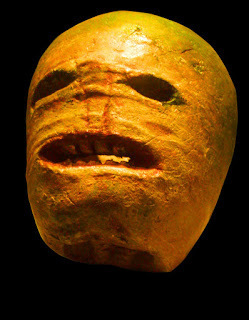 Turnip Jack-o-lantern, Wiki Commons
Turnip Jack-o-lantern, Wiki CommonsThis is not going to be a post gaaning aan about the “reason for the season” for Halloween or Samhain or whatever it is you wanna call it. I live in the southern hemisphere. Any neo-Pagan worth his or her salt will know we’re actually celebrating Beltaine here this time of the year. But that doesn’t stop me from tapping into the energy from my brethren in the north, for whom October 31 is firmly a night to remember the dead. The shared subconscious doesn’t worry about such niceties of summer and winter.
Two years ago on this day, a close friend and mentor of mine passed away. Trust him to wait ’til October 31. He was forever the merry prankster. All things considered, 2010 in general hadn’t been a good year for me. I tried to tip myself over the edge too. Stupid in hindsight, but then due to various reasons I’m not going to go into, I wasn’t in my right mind, and at the time I didn’t see any point in remaining alive. No point in convincing someone that life’s worth living when they can’t see the forest for the trees. When they don’t feel as though they have anything meaningful to contribute to the world.
I had a reprise last year, or maybe these were ripples from the previous year, which culminated in me experiencing a seizure followed by a life-threatening medical condition and five days in hospital with near liver failure.
This year, I’ve got a lot to be thankful for. I’m sober. I haven’t intentionally drunk alcohol for almost a year. No more wild nights. Call me a boring teetotaller if you will, but my life is now underpinned by a sense of intense clarity, as though I can view the world through a lens that has been wiped clean of grime and bugs. What I feel the most? Relief. Relief that I don’t have to chase after illusory pleasures that dissipate in the garish light of dawn. Because that sort of pleasure, at the bottom of a bottle, can never satisfy. It is never enough, and the more you drink, the more that hole keeps getting bigger and bigger inside you until none of the wine in the world will ever fill the abyss. But I don’t expect you to understand, unless you’ve actually stood on the brink yourself.
Yes, I’m going to die one day, but there’s no sense in obsessing about the inevitable. There’s also no sense in engaging in the sorts of behaviour that will hasten that particular outcome. Death’s waiting for all of us. Might as well extract every ounce of pleasure from life, and engage in activities that promote life.
So what if I didn’t play guitar for more than a decade? There were always other excuses (too tired, too busy). Fuck it. I’ve been playing almost every day now for six months now. I indulge almost daily in the activity. It’s time I’ll never get back, but fuck it feels better than wasting my attention on social media talking about the pieces I’m intending to play or harping on about the bad old days. I played my first performance recently. I didn’t falter. That sense of accomplishment is without price.
Oh, walking the dogs. Seems a waste of time doesn’t it? Scum it. I’ll drag the husband out. We might [oh gasp] have a real conversation instead of him zombie-ing out with the PlayStation and me watering an imaginary garden that exists only on the internet. The pooches of course love the exercise, and we might not be burning calories at gym but at least we’re enjoying the environment in which we’ve chosen to live. I never saw much of it over the past few years because I was always hunched in front of a computer screen.
Hell, I’ve started reading. I mean *really* reading—not just fiction, but philosophy, biographies, histories. And I’ve been learning to do stuff. Stupid shit like crochet. I always talked about one day learning how to do this. I’m actually *doing* it now. Teaching myself as I go along. And oh, look, I’m *making* stuff. Finishing stuff.
For three years I chased an ideal of work, that by spending hours and hours of my life *after* work each day slaving away on editing other people’s manuscripts, that I could somehow become a better person, drag myself out of my situation, and make up for the chaos in my personal life. This was not indulgence. It was me hiding away, burying myself alive, making excuses as to why I was not living. I was the living dead.
So, October 31, this is the day I consider remembering not just my dead, but also my past harvests—whether they be poor or good. There is no beating myself up about mistakes, but there is acceptance, and commitment to move ahead. I own my mistakes, I remember them but instead of allowing them to become millstones, I use them to lay the foundations for building a living temple in which I enthrone the flame of my Self. A temple. Not a mausoleum.
Published on October 31, 2012 00:13



